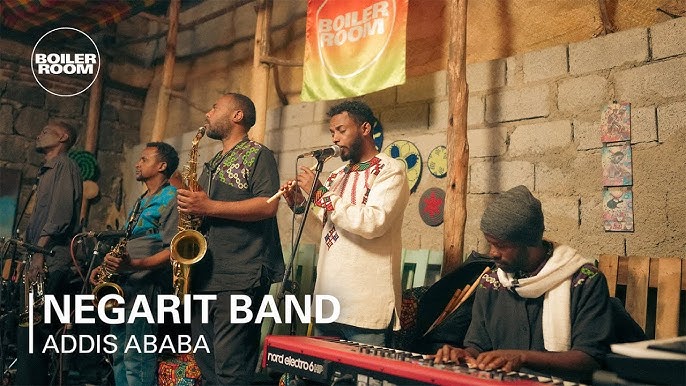Date:
Share post:
Now, Boiler Room has landed in Addis Ababa, bringing with it a new kind of spotlight to Ethiopia’s musical vanguard. In collaboration with Ethiopian Records (Endeguena Mulu), a pioneer of “Ethiopiyawi Electronic,” this latest installment in their Broadcast Lab initiative is more than a concert series—it’s a cultural moment. For the first time, the world is witnessing Ethiopia’s experimental music scene presented not as a footnote to its rich traditional past, but as a bold, futuristic force in its own right.
What makes this Boiler Room event remarkable is not just its location—but its ethic. Unlike many global platforms that parachute into “exotic” destinations for content extraction, Boiler Room Addis Ababa was built by and for local creatives. Ethiopian Records didn’t just perform—he curated the lineup, conceptualized the event, and ensured that the sound of Addis was captured authentically. It’s a case study in decolonial music broadcasting.
This shift is deeply significant in a country whose traditional music—rich with polyrhythms, modal scales, and storytelling instruments like the krar and masenqo—is often celebrated internationally, while contemporary Ethiopian musicians pushing sonic boundaries are overlooked. This event changes that. It not only archives a moment—it broadcasts a message: Ethiopia’s sound is not frozen in the past. It’s alive, adaptive, and global.
Each act featured in the Boiler Room broadcast offers a distinct take on what it means to create music in, and for, a modern Ethiopia. The performances defy easy categorization, spanning from hybrid jazz to techno laced with folk chants. Together, they form a constellation of sound—deeply local, unapologetically experimental, and globally resonant.
As the lead curator and performer, Ethiopian Records embodies the ethos of sonic resistance and innovation. He has long championed “Ethiopiyawi Electronic”—a genre he describes as “both a memory and a dream.” In his Boiler Room set, he samples ancient folk vocals, fragments them digitally, and reconstructs them into glitchy, haunting compositions. His work is not just music—it’s a philosophy of cultural continuity and transformation.
This group revives the Azmari tradition—Ethiopia’s wandering poet-musicians who use satire and storytelling—by layering their vocals and stringed instruments over electronic loops and analog effects. Their set is ritualistic and reverent, yet radical. It’s a conversation between past and present, between oral history and synthesized memory.
Steeped in the legacy of Ethio-jazz, Negarit Band’s performance injects classic 1960s Addis vibes into a contemporary frame. Horns and basslines flirt with funk grooves, while vocals soar in Amharic, invoking a nostalgic, cinematic soundscape. Their music nods to legends like Mulatu Astatke but steers toward new horizons.
Two of Addis’s most exciting DJs team up for a back-to-back set that moves across house, techno, and East African rhythms. It’s both club-ready and culturally rooted. Their performance reclaims the dancefloor as a site of transnational African futurism—where Berlin minimal meets Lalibela chants.
The closing set is a rhythmic explosion of Afrobeat, Gqom, old-school funk, and nods to golden-age Ethiopian tracks. Jazzy Dave brings the energy of diaspora and the streets together in a mix that is as playful as it is powerful. His set feels like a block party in motion—joyous, defiant, and wide open.
This Boiler Room session doesn’t merely showcase music. It documents a shift in how Ethiopia is seen—and how Ethiopians see themselves—on the global cultural stage. By centering local artists and aesthetics, this event resists the reductive tropes that often plague African music coverage abroad. There’s no “tribal mystique” here. No flattening of Ethiopia into ancient ruins and famine imagery. What we see instead is a contemporary Ethiopia—messy, creative, modern, and deeply proud.
Moreover, this moment speaks to sound as a form of sovereignty. By creating spaces for self-expression, artists like those in the Addis Ababa session claim not only artistic agency but narrative control. This is not “world music” framed for Western curiosity. It’s a global broadcast of homegrown visions.
Each set is now available on Boiler Room’s official YouTube channel. Whether you’re new to Ethiopian music or a longtime listener, this series is an essential viewing experience:
📺 Boiler Room: Addis Ababa – Full Playlist
🔸 Ethiopian Records – Live Set
🔸 Azmari Synthesis – Live Set
🔸 Negarit Band – Live Set
🔸 Nerliv B2B Dotphic – Live Set
🔸 DJ Jazzy Dave – Live Set
Boiler Room’s Addis Ababa broadcast is not just a one-off event—it’s a blueprint for how music platforms can engage ethically and meaningfully with local cultures. By shifting the spotlight without seizing the microphone, it creates space for artists to define themselves on their own terms.
And for Ethiopia’s young, creative generation—many of whom are negotiating identity, tradition, and modernity in real time—this is a powerful affirmation: you do not need to sound Western to be heard globally. You just need to sound like yourself.
Boiler Room Comes to Addis Ababa: Why the World’s Most Iconic Underground Music Platform Matters for Ethiopian Sound – Addis Insight
RELATED ARTICLES
